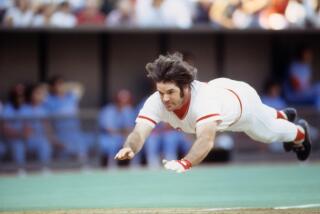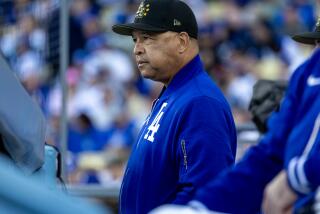Baseball and Drugs: A Saber Rattling or Smoke Screen? : Ueberroth, Despite Appearances, Is Doing More Than Just Talking : Baseball
- Share via
On the subject of drugs and the dangers they pose to the nation, baseball Commissioner Peter Ueberroth has seemed to assume a public posture of political saber rattling.
Employ AWACS reconnaissance aircraft. Call out the Marines. Scorch the poppy and marijuana fields--wherever they are found.
Privately, however, in his own domain, the question seems to be: Has Ueberroth been operating with only a pop gun?
Outfielder Lonnie Smith of the Kansas City Royals said as much in a Kansas City Times story Tuesday, implying that Ueberroth’s drug-related suspension of 11 players--Smith included--on Feb. 28, 1986, has proved to be something of a charade.
Smith added that the original penalty called for him to be tested six to eight times a year but that he has not been tested once this year, that he has paid $42,000 of an $85,000 fine and that no one has said anything to him about paying the rest and that he has performed 100 hours of community service with no certainty that it has been verified by the commissioner’s office.
Ueberroth was unavailable for comment Tuesday, which has been his standard practice recently. Spokesman Rich Levin pointed out that Smith, as a free agent, was not re-signed by the Royals until May 18, did not join their Omaha farm club until May 30 and did not report to Kansas City until July 14.
“For much of this season he was out of baseball and in limbo,” Levin said, “but he will be tested. The guidelines of the program specify that he can’t be tested more than four times in a year, not the six or eight he’s talking about. The key is that it’s random testing, which means that the number of times he’s tested isn’t quite as important.
“Our concern is that he stays eligible and not with what he says. We are monitoring the hours (of community service) and the payments. Lonnie Smith is in no position to judge. We are talking to the agents and attorneys and gathering documentation. We do have files on everybody. Some (of the disciplined players) have already completed the program.”
Levin would not reveal names, citing confidentiality. It will be recalled that Ueberroth, acting on testimony taken in the 1985 drug trial of Curtis Strong, clubhouse caterer of the Philadelphia Phillies who was convicted of selling drugs to players and sentenced to 12 years in federal prison, handed down the following penalties:
--Keith Hernandez, Dave Parker, Jeffrey Leonard, Joaquin Andujar, Dale Berra, Enos Cabell and Smith were suspended for a year, with the suspension to be held in abeyance if the players donated 10% of their 1986 base salary to an approved drug program, contributed 100 hours of community service work in both 1986 and ’87 and agreed to random testing for the rest of their careers.
--Al Holland, Lee Lacy, Lary Sorensen and Claudell Washington were suspended for 60 days, with the suspension to be held in abeyance if the players donated 5% of their 1986 base salary, contributed 50 hours of community service work in 1986 and agreed to random testing for the rest of their careers.
The Major League Players Assn. responded by filing a grievance, challenging Ueberroth’s authority. A decision on that grievance is still to be delivered.
It was later reported by The Times, under a Nov. 7 headline that read ‘Baseball Drug Penalties More Lenient Than First Thought,’ that the seven players who drew the stiffest penalties had 25 months--or until the spring of ‘88--to meet the financial stipulations.
In that story, Smith’s agent, former pitcher and now Congressman Jim Bunning, said: “We have two years to meet the financial requirements and we’re right on line. We’re reporting to them monthly. We’re fulfilling our end of it.”
Smith’s statements in the Kansas City Times raised the question of whether the commissioner is fulfilling his end of it, giving substantive voice to the media skepticism that greeted Ueberroth’s initial announcement regarding the penalties.
What is the truth? Was it all a charade? Whatever happened to Ueberroth’s announced plan for testing throughout the minor leagues? Is Ueberroth operating only with a pop gun?
There are no definitive answers, but it seems safe to draw the following conclusions:
--Whatever his long-range goals, be they the White House, Capitol Hill or the rumored chairmanship of E.F. Hutton, it is unlikely that Ueberroth would have used the drug suspensions as simply a grandstand play with no follow-up. He is a man who believes in getting a job done and usually does, and among his current priorities, the obliteration of drugs seems to be No. 1, a passion frequently leading to Patton-type rhetoric, leaving Ueberroth an easy mark for media cynics.
--The Dwight Gooden and LaMarr Hoyt incidents prove that baseball is not free of drugs, as Ueberroth has claimed, but he also seems to have drawn an inordinate amount of criticism for a statement often taken out of context. Ueberroth said that baseball was free of drugs in that it would never again be damaged by a widespread incident such as the Pittsburgh drug trial but that there might continue to be an occasional brush fire.
--Smith’s contention that Ueberroth has “done nothing” is unfair. Union grievances struck down his attempts to initiate a drug plan based on random testing, to include a testing clause in all multiyear contracts, and to suspend Hoyt for a full year. Hoyt’s suspension was reduced to 60 days.
There have been more setbacks than triumphs but whether Urging AWACS or specimen bottles, Ueberroth has seemed to be legitimately active in the drug war.
More to Read
Go beyond the scoreboard
Get the latest on L.A.'s teams in the daily Sports Report newsletter.
You may occasionally receive promotional content from the Los Angeles Times.










